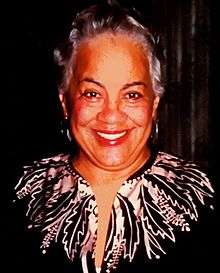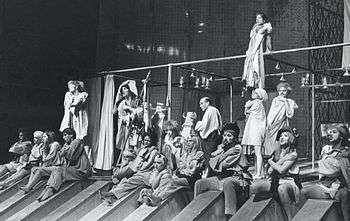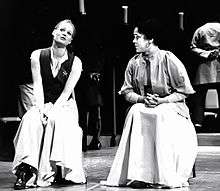Marie Goodman Hunter
Marie Goodman Hunter is an American actor, singer, and educator born on October 16, 1929. Her adoptive parents, Fred and Florence Goodman, named her Florence Marie Goodman.

Early life
Young Florence Marie attended public schools in Richmond and Petersburg, Virginia. She discovered her innate musical ability when her parents took her as a child of six to a Palm Sunday ceremony at a family member's school. The festivities were to include a vocal recital, but the singer did not show up. Young Marie, thinking that singing was everyone's natural gift, volunteered to entertain. And she did. With no prior lessons, she sang the familiar hymn, "I Come to the Garden Alone"—to great acclaim.[1] Years of lessons followed. She attended Armstrong High School in Richmond. At Virginia State University in Petersburg, she was certified as a music teacher. Her first teaching assignment was in 1950 at the Luther Foster High School in Blackstone VA. She next served as a member of a team of arts specialists who would visit Richmond schools in turn, to share their musical expertise with the regular teachers.
She married Charles Hunter on August 28, 1954 (divorced in 1969). In 1966, they adopted their daughter, Kelley Allyson Hunter.
Civil rights and civic behavior
In 1962 Marie Goodman Hunter helped to break the color barrier as a member of the first contingent of African-American teachers assigned to Richmond's William Fox Elementary, a previously all-white school. From 1961 to her retirement in 1991, she taught at John Marshall High School. She continued her own education with studies at Columbia University's Teachers College, the University of Virginia, and the College of William and Mary. Although her main subjects were Music and Speech, Goodman Hunter took pride in teaching the highest standards of citizenship to her students and instilling in them a deep appreciation for the civic virtues of "manners and respect [and] personal hygiene." She was enthusiastic and demanding in her love of music and her distinctly maternal nurturing of her choir "children." Combining discipline with respect, she set rigorous standards, remembered by her daughter Kelley—who was also her pupil for a time--"She demanded respect. She taught us how to carry ourselves and to know that when we step out in the world we should carry ourselves in the same way."[2] Of her teaching style, Goodman Hunter says, "I was very blunt, very abrupt at times. But I did what it took to get the message across. I am proud of my teaching years. ...[M]y children were ... on the ball probably because I scared the hell out of most of them."[3] She led her choir and the Marshall Singers to perform for local churches, community events, and for government officials. Among her students she earned the “nickname ‘Z’! Representing The End! There would be no one and nothing after her!”[4]
Singing and acting
In her non-school hours, Goodman Hunter's mezzo-soprano voice made her a much sought-after soloist at a number of Richmond churches, including the First Baptist Church of South Richmond and Garland Avenue Baptist. As she became more and more used to public performance, she discovered that she also had a talent for acting.
"An Actress Who Happens to be Black"
For a black woman, theatrical opportunities were limited, but her combined singing and acting talents secured her place as the first African-American in the cast of The Common Glory, the annual patriotic pageant in Williamsburg VA,[5] and she made early appearances at the Barter Theater in Abingdon and Swift Creek Mill Theater in Colonial Heights.

Asked about the casting odds she faced, Goodman Hunter said, "I appreciate directors who hire you as an actress who happens to be black and not as a black actress."[6] In the late 1950s and early ‘60s, the top community theater in the state was the new Virginia Museum Theater (VMT, now known as the Leslie Cheek Theater), built within the Virginia Museum of Fine Arts. Goodman Hunter was among the first African-Americans to perform on the VMT stage,[7] even while racial separation was the law of the land. During that era black actors were restricted to playing crowd extras or race-specific roles, usually as maids and other servants. In the late ‘60s, in the aftermath of segregation, a new VMT director, Keith Fowler, cast her to play non-racial parts in several productions, including the controversial Marat/Sade, in which she played Cucurucu.[8]
When VMT attained full professional repertory status, Goodman Hunter was one of the local actors to be awarded an Equity contract, elevating her to professional rank in the VMT Rep company that included Ken Letner, E.G. Marshall, Alfred Drake, Janet Bell, Lynda Myles, and dramaturg M. Elizabeth Osborn. In 1974 she showed her acting, singing, and dancing abilities on the VMT stage as the Innkeeper's Wife in Man With a Load of Mischief.[9] Among major roles she played at VMT are Berenice in The Member of the Wedding, Missy in Purlie, Ginny Jenny in The Threepenny Opera, and Adelaide in Guys and Dolls.[10] Goodman Hunter’s acting and musical skills won particular acclaim for her work as Adelaide. Although the role had been traditionally played by white performers, reviewers saw Goodman Hunter as the standout of the production, stating “Miss Adelaide may be her finest hour.”[11]
"Commanding Authority"
From playing ingenues to grande dames, she impressed fans with her "astounding" range, from "impish wit" to "commanding authority."[12] Her immersion in several classical plays at VMT paid off when the American Revels Company later opened at Richmond's Empire Theater (with a subscription campaign headed by Goodman Hunter and Alfred Drake) and she was contracted to play one of Shakespeare's most powerful females—Emilia in Othello.

Her reputation spread far beyond local theaters, as she reprised her role as Berenice in The Member of the Wedding at the Tanglewood Barn Theater in Winston-Salem NC and went on to perform leading roles at the McCarter Theater in Princeton NJ and at the Alabama Shakespeare Festival. In 2002 and 2003, she starred in The Life and Songs of Muriel Smith in Caux, Switzerland.
Continuing her work on Virginia stages, she appeared in a Tribute to Black Composers at the Kennedy Center for the Performing Arts and played in Having Our Say—the Delaney Sisters at Richmond's Theater IV. In 1982 she received the Mayor's Award for “Most Outstanding Contribution to the Arts.” Over her many years on Richmond stages, she has become one of the region's most extensively honored performers, widely celebrated for her singing and acting as well as for her passionate community spirit, and winning a record total of six Phoebe awards as “Best Actress” from Richmond Newspapers.[13]
Although retired from regular performing, Goodman Hunter still makes occasional guest appearances and performs for special events, such as her re-creation of Maggie Walker's famous 1901 "St. Luke Speech" for the Walker Centennial in 2009[14] and her sold-out "Marie Goodman Hunter in Concert" in April 2011.[15] She is particularly fond of appearing with familiar stage partners and local music celebrities, Steve Bassett and George Epps, as she did recently along with Larry Bland and the Volunteer Choir in June 2012.[16]
References
- Tupponce, Joan, "Marie Goodman Hunter: A Lifetime on the Stage," FiftyPlus, George Cruger, ed., Richmond VA, January 1999, 8
- Hunter, Kelley, quoted in Tupponce, 9
- Tupponce, 9
- Short, Valencia Adkins, “Marie Goodman Hunter,” testimonial letter posted March 16, 2014, https://commons.wikimedia.org/wiki/File:Adkins_Short_Testimonial.jpg Archived 2014-03-26 at the Wayback Machine
- "Marie Hunter to Sing at Williamsburg," The Afro-American, June 2, 1956 https://news.google.com/newspapers?nid=2211&dat=19560602&id=FNUmAAAAIBAJ&sjid=owIGAAAAIBAJ&pg=3967,6089426
- Tupponce, 9
- Under director Jimmy Dyas, as noted by George Cruger in FiftyPlus, 2
- Cast List page from Marat/Sade program, Oct., 1969 - https://commons.wikimedia.org/wiki/File:Marat_Sade_program.jpg
- VMT Season Program, 1973-74, Title Page "Cast"
- VMT Season Programs, 1972 through 1976
- Sobel, Jerrell, drama editor, “’Guys and Dolls’ A Love(ly) Story,” Petersburg Progress-Index, November 4, 1975
- Fowler, Keith, "A Tribute to Marie Goodman Hunter" https://www.facebook.com/notes/keith-fowler/a-tribute-to-marie-goodman-hunter/10152127030492839
- Awarded by drama editor Roy Proctor of The Richmond News Leader (and later the Richmond Times-Dispatch), her Phoebes were for her performances in The Member of the Wedding, 1976; Purlie, 1978; A Raisin in the Sun, 1985; The Amen Corner,1987; ’Night, Mother, 1988; and Having Our Say--The Delaney Sisters, 2001
- Documented by video at https://www.youtube.com/watch?v=UyG87b339qs
- For the Richmond Jazz Society's celebration of the Smithsonian Institution's 10th anniversary of "Jazz Appreciation Month" - http://richmond.eventful.com/events/marie-goodman-hunter-concert-/E0-001-037640325-7
- http://faithinrichmond.com/2012/07/music-connects-us/